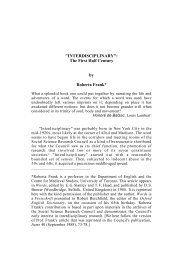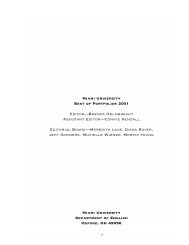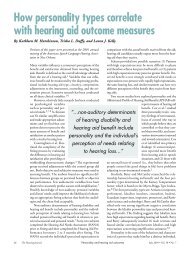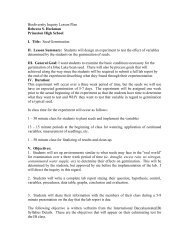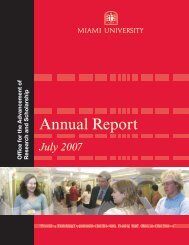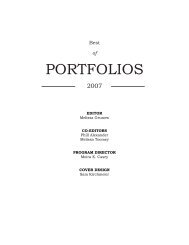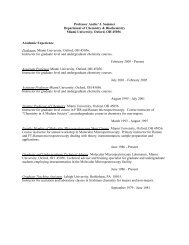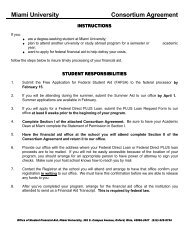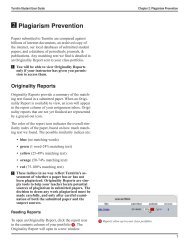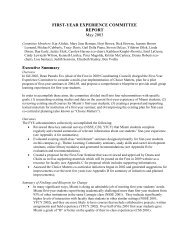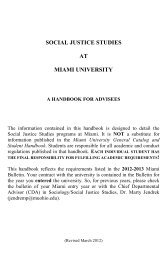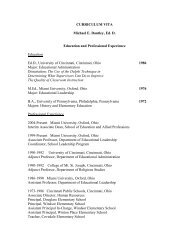Interdisciplinary Research Manual - Units.muohio.edu
Interdisciplinary Research Manual - Units.muohio.edu
Interdisciplinary Research Manual - Units.muohio.edu
Create successful ePaper yourself
Turn your PDF publications into a flip-book with our unique Google optimized e-Paper software.
7<br />
that particular combination of disciplines to study the problem). You need a problem or<br />
question to guide your research, however, because you won’t gain a better understanding<br />
of the context by wandering around aimlessly in it; you need to see how it plays out in a<br />
particular problem (or issue or question) to make any progress in understanding it. Even<br />
if you don’t gain any new insights into the context through your research, you can at least<br />
better understand the problem (or more fully answer the question) you started out with.<br />
Select a topic that works no matter the outcome of your research. Don’t present<br />
your topic as a study of the impacts of the Nuremburg trials of Nazi war criminals on the<br />
tribunals trying Slobodan Milosevic and Saddam Hussein (which presumes Nuremburg<br />
had impacts on those tribunals). Instead, present it as a study of war crimes trials (which<br />
allows you to draw on all three without depending on any particular outcome of your<br />
data).<br />
“Creative Projects”<br />
Start the creative portion of your project earlier than you think you need to<br />
because it will take longer than you think it will. In particular seniors tend to<br />
underestimate how much time the practical logistics will take. Seek out faculty (or<br />
nonacademic experts) outside Western early on for advice on how to proceed with the<br />
creative portion of your project. The senior project as a whole takes longer when it<br />
involves a creative portion because in most cases you really need to immerse yourself in<br />
the scholarly literature first so that your choices about the creative portion can be<br />
informed by it.<br />
The creative portion of a senior project will be evaluated by the normal standards<br />
for that kind of activity; and the appropriateness of a proposal to undertake a creative<br />
portion of a senior project will (like the analytical portion of the project) be judged<br />
according to your background in that kind of activity. If you propose to write a collection<br />
of short stories as the creative portion of your senior project, you will be asked how many<br />
courses you have taken in creative writing, and the short stories themselves will be<br />
judged largely according to the criteria and standards used in creative writing courses.<br />
We recognize that students can develop competencies outside of formal coursework, but<br />
a student without formal course work in that creative activity will be asked to point to<br />
other significant prior experience. A senior-level capstone course is the time for advanced<br />
work, not the time to try out a new medium; and the openness of the Program to<br />
unconventional approaches should not be confused with a lack of academic standards.<br />
How can you tell if the creative portion of your project is interdisciplinary? It<br />
depends on the creative medium. If you’re directing a play or film, conducting a musical<br />
performance, or otherwise producing an existing work, you’re doing much more than<br />
understanding and fulfilling the intention of the playwright, screenwriter or composer,<br />
and making sure the author’s ideas get manifested in a performance. You can conceive of<br />
the play/film/composition in many different ways. Ask yourself what perspectives on it<br />
are interesting and relevant. Those perspectives can include the perspectives of different<br />
disciplines on its subject matter, the perspectives of different political and social<br />
ideologies on the issues it addresses, or the perspectives of competing schools of thought<br />
within the artistic discipline itself (such as between Augusto Boal and Eric Sondheim<br />
within theatre). Ask yourself what the strengths and weaknesses of each are, and then<br />
what you can pull together from these disparate approaches in a coherent and meaningful



